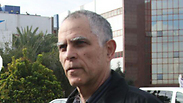
Yedioth publisher Arnon Mozes. This affair is an excellent opportunity for self-examination
צילום: אבי מועלם
We must know everything about Netanyahu-Mozes affair
Op-ed: There is no reason for the attorney general to keep the recordings between the prime minister and the Yedioth publisher confidential. It damages the public’s trust in the media and in the PM and allows countless manipulations. As long as the recordings are not exposed, we—Yedioth’s writers and editors—are suspects too through no fault of our own.
Let’s not play dumb. On the one hand, we are not allowed to ignore “the affair” focusing on the prime minister and on the publisher of the newspaper we write for. On the other hand, every word that is written here is under a cloud. Yes, we have a problem. We can’t keep telling ourselves that nothing has happened, that it’s just quotes, perhaps selective quotes, that may have been taken out of context, which is why nothing is clear. We are journalists after all. We build on leaks and on partial quotes.

But one thing has to be clarified. Believing that the newspaper’s publisher can dictate to someone what to think against his will is ridiculous. It’s not that the publisher doesn’t have any influence in certain contexts; of course he does. There is not a single newspaper with no influence whatsoever. Up to a certain point, it’s legitimate. Beyond that, it becomes a problem. If things did happen, they should be exposed. We cannot just preach to others; we have to look at ourselves as well. And this affair is definitely an excellent opportunity for self-examination.

The Yedioth Ahronoth news desk. Believing that the newspaper’s publisher can dictate to someone what to think against his will is ridiculous
I have been writing for Yedioth Ahronoth for just two and a half years. In the only meeting I ever had with publisher Arnon Mozes, he told me only one thing: You are free to write whatever you want, and if there’s a problem, my door is open. I never turned to him, because I was never limited. When I wrote an article clearly against someone who is considered one of the publisher’s associates—and I have no idea if that’s true—one of the editors told me that the article might be rejected. I giggled. It was clear to me that it would not be rejected. Sometimes there is self-censorship, and that’s a problem too.
So there is an unexplainable gap between what I experienced and what is revealed from the quotes. It’s true that I did not vote for Prime Minister Benjamin Netanyahu. I have my own criticism against him, but I have written quite a lot of things in his favor. Has anyone stopped me?
The purpose of this personal testimony is not to say that there is no problem. There definitely is. And the quotes that have been leaked are troubling. The purpose of this testimony is to say that there is need for caution, because a newspaper—any newspaper—is an oppositional body. And apart from one newspaper in Israel, which serves one person, all newspapers had a clear line against Netanyahu, mainly because his conduct provided more and more reasons for that. Afterall, Channel 10 and Channel 2 have also been accused of persecuting Netanyahu.
Yedioth Ahronoth, might I remind everyone, has also published articles in favor of Netanyahu, not just by guest writers but by regular columnists. I am proud, therefore, to work in a newspaper which has such a broad spectrum of columnists who are given complete freedom. Some of the media personalities, and another small female politician, despicably used this opportunity to blast Yedioth. They know that we don’t act under orders, but pettiness won the day.
And so, this is mainly an appeal to the attorney general: There is no reason to keep the recordings confidential. We have to know everything, even things that we won’t like to hear as journalists or editors in this newspaper, and things that we won’t like to hear as citizens of the state about the prime minister. This vagueness is damaging. It damages the public’s trust in the media and in the prime minister. It allows countless manipulations. As long as the recordings are not exposed, we are suspects too—writers and editors—through no fault of our own. If there is justice, poet Hayim Nahman Bialik wrote in a much more painful context, let it show itself at once. And because there are things in this affair that are crying out for exposure—let them show themselves at once.
There is another question we have to deal with: Should Mozes leave his position as the newspaper’s managing editor? Why, surely, if he were a different public figure, we would have demanded a temporary suspension until the end of the investigation. Here, however, we are talking about an affair which involves two stars: Mozes and Netanyahu. The moment we demand that one of them suspends himself, we will only be punishing one of the two. That’s unfair. On a side note, themanner in whcih way Yedioth is covering the affair clarifies that Mozes is not intervening, and that’s a positive thing. Netanyahu, on the other hand, is still the communications minister. And he is intervening. He intervening big time.
The attorney general should therefore demand that Netanyahu suspend himself from the Communications Ministry and cancel the coalition agreement clause that forces all Knesset members who from the coalition to blindly obey any caprice he may have on communication issues. This clause is outrageous regardless of the affair, and it turns into corruption in broad daylight following the affair. When the attorney general presents such a demand to Netanyahu, I vow to be the first one to demand a similar thing from Mozes.










